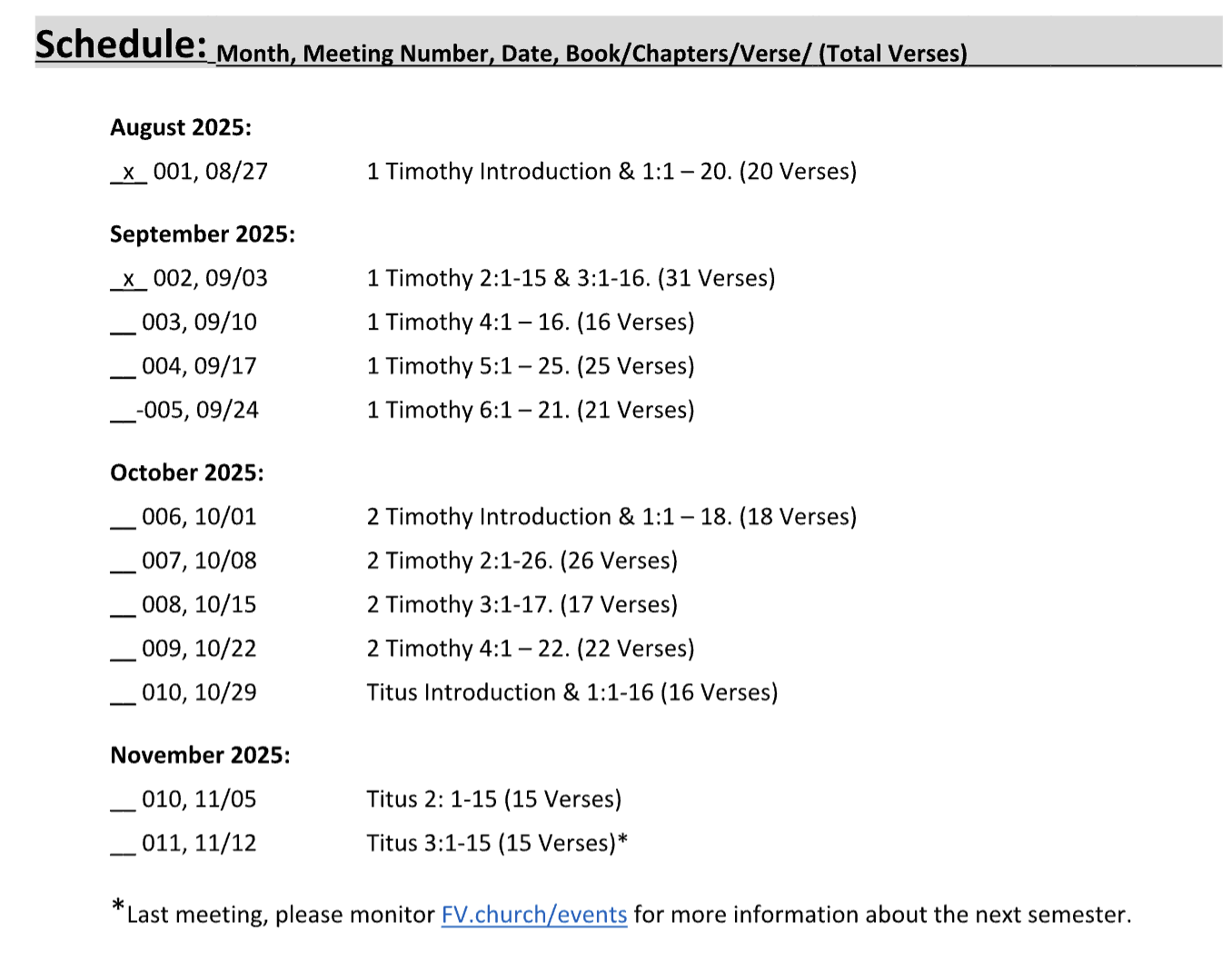Weekly Wednesdays: CALLED Men’s Group | Wednesday, September 03, 2025
Meeting# 2 of 12 | This Week’s Leader: David Goodno
Introduction: Welcome everyone, this is the second meeting of the Fall 2025 semester of the Men’s Growth Group Called. We will be meeting weekly every Wednesday, through Nov. 12, 2025; 7:00 pm – 8:30 pm.
There is no formal “membership” or specific requirements to attend; it doesn’t matter where you are in your faith journey – 10 seconds, 10-years or a lifetime; everyone is welcome; everyone has value; everyone has a voice. Keep in mind that we all come from various backgrounds, have different points of view; are at different places in our individual faith journey; the purpose of our meeting tonight is to come together, read the Bible, study God’s word and have a friendly discussion.
If there are differing points of view, we should not feel attacked or be hostile to one another; it’s our differences that add to the meeting and discussion. We came together tonight as friends and brothers in Christ; we should leave the same (as friends and brothers in Christ). Often there is no right or wrong answer; just interpretations of scripture ultimately, JESUS IS THE ANSWER.
This semester we are continuing a SOAP study* of First and Second Timothy and Titus. (*SOAP study: Scripture, Observation, Application, Prayer and Questions).
History of the letters: (1 & 2 Timothy )
Paul is author of these letters to Timothy, with Biblical scholars dating the two letters around 64 AD.
Paul wrote the letters to give encouragement and instruction to Timothy, who was a young leader sent by Paul to the Church of Ephesus. As a young minister Timothy faced all sorts of pressure, conflicts, false teaching and challenges from the surrounding culture. Paul instructed Timothy to preserve the Christian faith, remain disciplined; oppose false teaching, and to minister faithfully; by example.
Today we can use the letters to Timothy to strengthen our own faith and spiritual discipline.
This Week’s Prayer: Father God, we thank you for allowing us to come together and study your word tonight.
Father, we are grateful for the gifts and talents you have given me. Help us use these talents and abilities to honor you, spread the Good News and encourage others in their faith. – Amen
Scripture, Read: 1 Timothy Chapter 2 – 3
Observation, Application & Questions: (Identify/Discuss Among the Group)
Key verses for discussion:
(Chapter 2, verses 1-4) -
Paul based his instruction about to prayer for everyone; God’s invitation for salvation is for everyone, equally to all people. We should pray for those in authority around the world so that all societies across the world will be conductive to the spread of the gospel.
Read: John 3:16-21, discuss and Psalm 139:1-18, discuss
Paul’s command to pray for Kings is remarkable considering that Nero, who was known as a cruel, evil leader, was emperor at the time of Paul’s writing this letter. Also at this time persecution of Christians was a growing threat and Nero blamed Roman Christians for a fire that destroyed much of Rome. He did this to deflect the focus from him onto Christians. This blame fueled Christians being denied regular privileges, with some being publicly butchered, burned or fed to lions and other animals. – Paul’s message indicates that no matter who the ruler is; if we agree or disagree with their leadership or decisions – we should pray for them.
Conduct a Google search: “Great Fire of Rome 64 AD” and “Nero, good or evil ruler of Rome?”
(Chapter 2, verses 5-8)
There will be many false claims by people that there are multiple ways to get to God. Paul instructs us that there is only one God and one Mediator – that is Jesus – who can reconcile us to God.
Read: John 14:1-14, discuss and John 10:1-18, discuss.
Jesus is telling us that there is only one way for people to enter into God’s protection, salvation and abundant life. Just as a gate provides safety and access to the sheep pen, Jesus is the only wat to God. No one can reach God or enter into the community of believers through any other path. By entering through Jesus, people receive salvation and are protected from destruction and chaos.
(Chapter 2, verses 9-15)
When Paul says women should be modest in their appearance, Paul was not condemning make-up, wearing of gold or fixing their hair. Paul was simply saying that women should not draw attention to themselves through their appearance or dress. Modesty and decency are key words here. The general rule for both men and woman is that both behavior and dress must express submission and respect to Jesus Christ – And represent the Church well. Many times, how we appear is all people will see, we want to be inviting and respectful, if our dress and behavior is off-putting, how will that aid in spreading the gospel?
Verses 11-15 are often the most quoted scripture when it comes to dissuading or putting down female preachers and pastors. But before we apply this scripture, we need to know the context in which it was said so we know how to properly apply it to our lives. In first-century Jewish culture, women were not allowed to study. So, when Paul said that woman should “learn quietly and submissively” Paul was offering the women an amazing opportunity to learn God’s word.
Paul himself acknowledges that women publicly prayed and prophesied. Biblical scholars believe that the women in the Ephesian church were abusing their newly acquired Christian freedom, and since these women were new converts, they did not yet have the necessary experience, knowledge or Christian maturity to teach those who already had extensive scriptural education.
Some believe and interpret this passage to mean that women can never teach in the church. However, Biblical scholars point out that Paul did not forbid women from ever teaching. Paul’s co-worker Priscilla taught the Great Preacher Apollos. The Ephesian Church was already undergoing a problem with false teachers, therefore Paul wanted those with the most knowledge to lead.
Read: Acts 18:24-26, Romans 16:1-4
(Chapter 3, verse 1-16)
To be an “Elder” in the church is a heavy responsibility. The Church belongs to God, and those within its leadership, the pastors, elders, youth and children’s ministry, the church councils, finance team etc. play a critical role in the direction and management of the church, all are responsible for the spiritual health of its members.
All believers even if they do not plan on becoming church leaders should have the goal of following Paul’s guidelines because they are consistent with what God says is true and right. We all have people within our circle of influence, we may not think of ourselves as leaders, but we are. Either we are leading someone else to Christ, or others are leading us, and possibly leading us astray. - Discuss
It is important that people outside the church see the church leaders and members in a positive manner, with good reputation. The church has a mission to care for and provide aid to one another and the secular world; it is important to build bridges with unbelievers in order to bring them the Good News and minister to them. – Discuss
Deacon means “one who serves” the qualifications for Deacons are the same as for elders and many churches today have Deacons and Elders as the same role within the church.
The final hymn of the chapter, Paul affirms the importance of Christ and our reliance on Him. Jesus is a perfect example of how we should live and do what is right. We live Godly lives through following Christ and making Jesus the center of our lives.
Other questions to explore:
What was the context? What was going on at the time this was written?
What and where is this happening?
What makes what was happening meaningful?
Is there anything special about the location (or locations)?
Who is involved?
How do they respond to God?
What character traits do you notice about them?
What is the significance of their involvement?
What do you think is the key message?
Did anything that surprised or stood out to you? What was it? Share with the group and discuss.
Are there any key verses that stand out to you? Discuss among the group.
Were there any repetitive words or themes that stood out to you? What were they?
---
Is there anything that left you with more questions? What were they? Share with group, discuss, and research.
Biggest takeaway?
Prepare for next week’s meeting. Read: 1 Timothy 4:1-16
Is there anything that stands out when reading these verses? Be ready to discuss it at the next meeting.
Think of things that you can do to encourage new believers over the next seven days.




